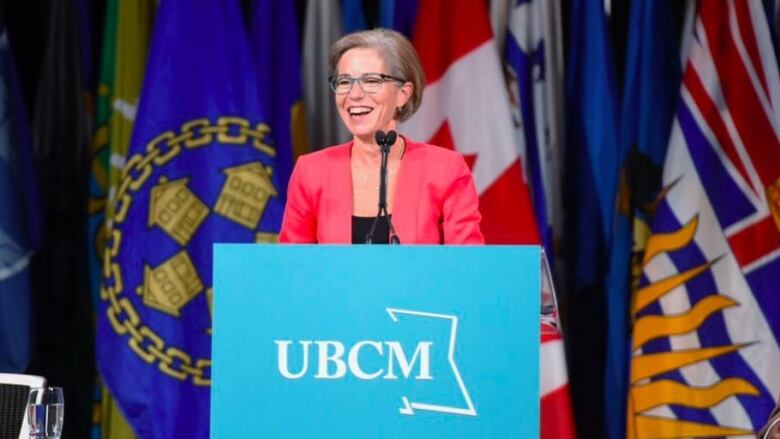B.C. government offers support for logging communities but says they need 'to bend and change'
UBCM conference rolled on as scheduled, while hundreds of logging trucks rolled outside

On a day where hundreds of logging trucks drove across B.C. to protest the loss of jobs in the forest industry, the provincial government said some change in their work was inevitable.
"We need to be [like a] willow: strongand resilientbut able to bend and change," said Municipal Affairs and Housing Minister Selina Robinsonduring her address to the Union of B.C. Municipalities (UBCM)on Wednesday.
Robinson acknowledged to mayors and councillorsfrom across B.C. the "challengesmany of your communities are facing due to the mill closures" and said the province would continue to rely on the forest industry.
But she also made no apologies for the government's strategy on the forestry file, highlighting new announcements this weekaround the expansion of wood frame construction around the province.
"We are changing how we live and work. This means new opportunities for industries and communities," she said.
Earlier this month, the province announced$69 million in aid to beleaguered workers, but part of that came from suspending the$25-millionRural Dividend Fund aimed at communities with populations of less than 25,000.
Robinson also announced that municipalities would soon be able to apply for a new round of mixed-income housing projects, $150 million more in grantsfor waste and wastewater projects. She alsoreleased a review of the province's development approval process, with a promise to cut red tape around building permits over the next year.
Over 200 trucks from all across the province drove down to the #UBCM to make their voices and concerns over the forestry industry heard. pic.twitter.com/9iXlT7RYWf
—@tinalovgreenProtest outside, infrastructure talk inside
The loggingtrucks were aimingto arrive at the annual UBCM conference, where municipal and provincial delegates are meeting all week.
But while they were ultimately stopped a block away from the convention centre where it's being held, some cabinet ministers could hear the blaring horns as they went about previouslyscheduled town halls with delegateswhere they faced the typical potpourri of questions from delegates on both pet issues and local concerns.
"Has your ministry started to think about a future where we'll have to have other methods of making road users pay for road use other than gas taxes?" Victoria Coun.Geoff Young askedTransportation Minister Claire Trevena.
"It's a challenge we're eager to grasp, but we are aware that there will be declining revenues. Fuel taxes are going down," she said.
"It's going to come quite quickly, and the Ministry of Finance is going to look for alternate forms of revenue, to make sure we continue to fund the infrastructure we'll still need for electric cars, electric bikes, buses, buses, buses, buses."
Other delegates wanted to talk about school construction, with Surrey Coun.Stephen Pettigrewlamenting the portables in his communityand Vancouver Coun.Lisa Dominato asking about building newschools that could be smaller or cheaper to constructin areas with rapid population growth.
On both questions, Education Minister Rob Fleming didn't promise any immediate change to their current strategy.
"Given the midpoint in our mandate, two years in, most people in Surrey who have been in there for al ong time would agree we're in apretty good place," he said.
As for Vancouver, Fleming said "we have to balance our seismic program with our growth program inplaces like Surrey and Chilliwack but that doesn't mean it's impossible."
Dominato said she was hoping to hear more.
"It's not helpful for us if we have empty spaces in schools in the southeast corner of the city, when we've got density in the northeast quadrant of the cityor downtown, so how do we look at building schools differently in the city," she said.
"I'm really looking for thinking outside the box, and I guess I'm not hearing that right now."












_(720p).jpg)


 OFFICIAL HD MUSIC VIDEO.jpg)
.jpg)



























































































